Pyeongchang (평창) is a city and a county in Gangwon. The city hosted the 2018 Winter Olympic and Winter Paralympic Games. Pyeongchang County's slogan, "Happy700 Pyeongchang", refers to the city's average elevation, approximately 700 m, which is said to make people live in best condition. Pyeongchang has three mottos related to this slogan. These are 'Best place for health, rest, leports - Happy700 Pyeongchang', 'The city of nature, health, longevity - Happy700 Pyeongchang', 'Optimal environment for human's life - Happy700 Pyeongchang'.
- Korea Travel Hotline & Complaint Center, +82-2-1330. 24 hr. Support Korean, English, Chinese, Japanese to announcing tour information, complaints and emergency calls. Free.
- Gangwon Tourist Information Office (Gangneung), 330, Gyeongpo-ro. Gangneung-si, +82 33-640-4531. Free.
- Gangwon Tourist Information Office (Chuncheon), 19, Chuncheon-ro, Chuncheon-si, Gangwon-do, +82 33-244-0088. Free.
Korea Travel Hotline & Complaint Center, +82-2-1330. 24 hr. Support Korean, English, Chinese, Japanese to announcing tour information, complaints and emergency calls. Free.
Gangwon Tourist Information Office (Gangneung), 330, Gyeongpo-ro. Gangneung-si, +82 33-640-4531. Free.
Gangwon Tourist Information Office (Chuncheon), 19, Chuncheon-ro, Chuncheon-si, Gangwon-do, +82 33-244-0088. Free.
| center |
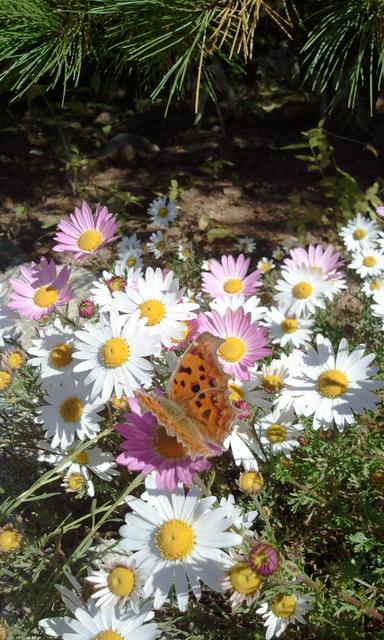
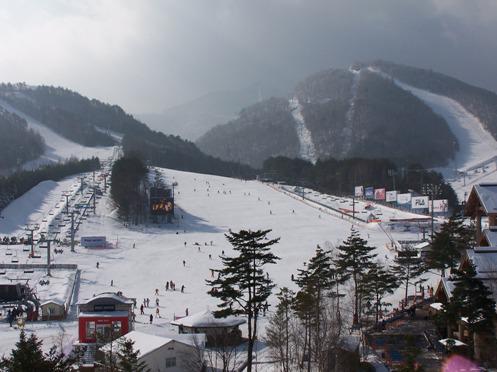
- Odaesan National Park. Odaesan National Park is one of the many famous mountains in Korea, known for its temples and waterfalls. Centered on Birobong, which rises 1,563 m above sea level, five peaks line up like a folding screen, while Sogeumgang Valley, which means little Mt Geumgangsan, is situated below. Mt Odaesan was a by-name for China's Shanxisheng Mt Qingliangshan but Jajangyulsa, who studied in these mountains during the Silla dynasty, decided to call the mountain in Korea Mt Odaesan since the features of the two mountains were very similar. As the physical aspects of Mt Odaesan are smoother than Mt Seoraksan, anyone can easily take up the challenge of hiking here. Also, people of all ages love Mt Odaesan as the perfect place for a forest bath.
- Odaesan Woljeongsa fir forest trails, 350-7, Odaesan-ro, Jinbu-myeon, Pyeongchang-gun, Gangwon-do.
- Daegwallyeong, Hoenggye-ri, Pyeongchang-gun, Gangwon-do, Korea / Seongsan-myeon, Gangneung-si, Gangwon-do, Korea. Daegwallyeong is a mountain pass in the Taebaek Mountains of eastern South Korea. At a height of 832 m, it is between Hoenggye-ri, Pyeongchang-gun and seongsan-myeon, Gangneung-si.
Odaesan National Park. [[Odaesan National Park]] is one of the many famous mountains in Korea, known for its temples and waterfalls. Centered on Birobong, which rises 1,563 m above sea level, five peaks line up like a folding screen, while Sogeumgang Valley, which means little Mt Geumgangsan, is situated below. Mt Odaesan was a by-name for China's Shanxisheng Mt Qingliangshan but Jajangyulsa, who studied in these mountains during the Silla dynasty, decided to call the mountain in Korea Mt Odaesan since the features of the two mountains were very similar. As the physical aspects of Mt Odaesan are smoother than Mt Seoraksan, anyone can easily take up the challenge of hiking here. Also, people of all ages love Mt Odaesan as the perfect place for a forest bath.
Odaesan Woljeongsa fir forest trails, 350-7, Odaesan-ro, Jinbu-myeon, Pyeongchang-gun, Gangwon-do.
Daegwallyeong, Hoenggye-ri, Pyeongchang-gun, Gangwon-do, Korea / Seongsan-myeon, Gangneung-si, Gangwon-do, Korea. Daegwallyeong is a mountain pass in the Taebaek Mountains of eastern South Korea. At a height of 832 m, it is between Hoenggye-ri, Pyeongchang-gun and seongsan-myeon, Gangneung-si.
- Baegnyong Cave, 82 Maha-ri, Mitan-myeon, +82 33-334-7200. 09:00-15:00. Baengnyong Cave is at the floor of Baegunsan Mountain. It is the first cave in Korea where visitors can engage in caving with the help of a professional guide. Designated as Natural Monument #260, the cave has diverse cave formations such as icicle-shaped stalactites, stalagmites formed on the ground, rock formations looking like fried eggs, and stone pillars formed by stalactites from the ceiling and stalagmites from the ground joining together. ₩15,000-10,000, group discounts.
Baegnyong Cave, 82 Maha-ri, Mitan-myeon, +82 33-334-7200. 09:00-15:00. Baengnyong Cave is at the floor of Baegunsan Mountain. It is the first cave in Korea where visitors can engage in caving with the help of a professional guide. Designated as Natural Monument #260, the cave has diverse cave formations such as icicle-shaped stalactites, stalagmites formed on the ground, rock formations looking like fried eggs, and stone pillars formed by stalactites from the ceiling and stalagmites from the ground joining together. ₩15,000-10,000, group discounts.
- Woljeongsa Temple, 63 Dongsan-ri, Jinbu-myeon. Famous for its Citadel Museum, which has on display numerous cultural relics and treasures, and an octagonal nine-stage stone pagoda. The huge fir tree forest road is so beautiful that it has been the setting of many dramas and movies. There is Woljeongsa museum and there are many Korean national treasure and many Buddhist arts.
- Sangwonsa, 1215-89, Odaesan-ro, +82-33-332-6666. Established during the Silla dynasty. King Yejong designated it as a memorial for his father, King Sejo during the Joseon dynasty. It was partially preserved during the Korean war, while Woljeongsa was burnt down. The bell of Sangwonsa is the oldest bronze bell in South Korea, which is famous with its clear and beautiful ring.
- Pyeongchang Hyanggyo, +82 33 330-2771.
Woljeongsa Temple, 63 Dongsan-ri, Jinbu-myeon. Famous for its Citadel Museum, which has on display numerous cultural relics and treasures, and an octagonal nine-stage stone pagoda. The huge fir tree forest road is so beautiful that it has been the setting of many dramas and movies. There is Woljeongsa museum and there are many Korean national treasure and many Buddhist arts.
Sangwonsa, 1215-89, Odaesan-ro, +82-33-332-6666. Established during the Silla dynasty. King Yejong designated it as a memorial for his father, King Sejo during the Joseon dynasty. It was partially preserved during the Korean war, while Woljeongsa was burnt down. The bell of Sangwonsa is the oldest bronze bell in South Korea, which is famous with its clear and beautiful ring.
Pyeongchang Hyanggyo, +82 33 330-2771.
- Potatoflower studio, 105 gogilcheollo, Pyeongchang-eup, +82 33-332-5337. In the village of Pyeongchang, Gangwon Province, a small village in Pyeongchang, Gangwon Province, a flower village called it was built to repair a small school called Nosan school, which was enclosed in the middle of a beautiful mountain village. The school has turned into an exhibition hall, a library, a museum, and a dining room.
- Pyeongchang Freshwater Fish Museum, 42-5, Maha-gil, Mitan-myeon. 09:00-18:00. After a plan for building a dam in Dong River was canceled, it was established in 2009 to promote the region. You can learn about fishes living in the river. Adult ₩2,000.
- Lee Seung-bok Memorial Hall, 500-1 Unduryeong-ro, Yongpyeong-myeon, +82 33-332-4323. The Lee Seung-bok Memorial Hall is in Nodong-ri, Yongpyeong-myeon to memorialize Lee Seung-bok who was a South Korean boy murdered by North Korean commandos in 1968. It was established in 1982, with building a memorial statue for Lee. Lee's house was restored in 2000.
- Jeonggangwon, 21 Baekokpo-ri, Yongpyeong-myeon. Jeonggangwon was established with the aim of doing research on the value and excellence of Korea's traditional food culture, distributing and publicizing the Korean traditional food culture into the world. It is operated to make it possible for visitors to learn and experience the Korean traditional food culture, and Jeonggangwon is the place where visitors can feel the beauty native to Korea other than a simple touring site.
Potatoflower studio, 105 gogilcheollo, Pyeongchang-eup, +82 33-332-5337. In the village of Pyeongchang, Gangwon Province, a small village in Pyeongchang, Gangwon Province, a flower village called it was built to repair a small school called Nosan school, which was enclosed in the middle of a beautiful mountain village. The school has turned into an exhibition hall, a library, a museum, and a dining room.
Pyeongchang Freshwater Fish Museum, 42-5, Maha-gil, Mitan-myeon. 09:00-18:00. After a plan for building a dam in Dong River was canceled, it was established in 2009 to promote the region. You can learn about fishes living in the river. Adult ₩2,000.
Lee Seung-bok Memorial Hall, 500-1 Unduryeong-ro, Yongpyeong-myeon, +82 33-332-4323. The Lee Seung-bok Memorial Hall is in Nodong-ri, Yongpyeong-myeon to memorialize Lee Seung-bok who was a South Korean boy murdered by North Korean commandos in 1968. It was established in 1982, with building a memorial statue for Lee. Lee's house was restored in 2000.
Jeonggangwon, 21 Baekokpo-ri, Yongpyeong-myeon. Jeonggangwon was established with the aim of doing research on the value and excellence of Korea's traditional food culture, distributing and publicizing the Korean traditional food culture into the world. It is operated to make it possible for visitors to learn and experience the Korean traditional food culture, and Jeonggangwon is the place where visitors can feel the beauty native to Korea other than a simple touring site.
- Eoreumchi Village, 42-5, Maha-gil, Mitan-myeon, Pyeongchang-gun, Gangwon-do, +82 33-332-1260. The township in the clean nature is beautiful with mountain scenery and valley made up of the meandering river and rock stratum. You can enjoy various water sports such as rafting, kayaking, skyline, etc., and you can enjoy stunning stalagmites in Baekryong Cave, Natural Monument 260, a limestone cave. Adult ₩39,000, child ₩33,000.
- Hyoseok Cultural Town, 157, Ihyoseok-gil, Bongpyeong-myeon, Pyeongchang-gun, Gangwon-do, +82-33-335-9669. Closed on Mondays, January 1, Thanksgiving. The town is a tourist attraction as the background of the novel, When Bucketwheet Flowers Blossom (1967). Each year the festival will be held here in late summer, late August early September. (cf. 2016 Hyoseok Cultural Festival) Adult ₩2,000, teenagers ₩1,500, youth ₩1,000.
Eoreumchi Village, 42-5, Maha-gil, Mitan-myeon, Pyeongchang-gun, Gangwon-do, +82 33-332-1260. The township in the clean nature is beautiful with mountain scenery and valley made up of the meandering river and rock stratum. You can enjoy various water sports such as rafting, kayaking, skyline, etc., and you can enjoy stunning stalagmites in Baekryong Cave, Natural Monument 260, a limestone cave. Adult ₩39,000, child ₩33,000.
Hyoseok Cultural Town, 157, Ihyoseok-gil, Bongpyeong-myeon, Pyeongchang-gun, Gangwon-do, +82-33-335-9669. Closed on Mondays, January 1, Thanksgiving. The town is a tourist attraction as the background of the novel, When Bucketwheet Flowers Blossom (1967). Each year the festival will be held here in late summer, late August early September. (cf. 2016 Hyoseok Cultural Festival) Adult ₩2,000, teenagers ₩1,500, youth ₩1,000.
- Pyeongchang Hyoseok Culture Festival. Late August - early September. Lee Hyoseok, one of the greatest authors of modern Korean literature, holds the festival at Pyeongchang, the actual stage of the story, When the Buckwheat Flowers Bloom. During the festival visitors can also enjoy the special ambiance created by the prolific buckwheat flowers.
- Fun Ski Festival. Early December to early March, around seven times. A ski festival for foreign visitors in Yongpyeong Resort, the Mecca of Korean skiing. For three nights and four days, participants enjoy ski lessons, dinners and various events. On the last day, all participants take part in a ski competition. Many foreigners participate in this romantic winter festival every year to enjoy the snow, skiing and parties.
- Pyeongchang Trout Festival, Gangwon-Do, Pyeongchang-Gun, Jinbu-Myeon, Gyeonggang-Ro, 3562(Street address), +82 33-336-4000. 09:00-17:00. Every year, Pyeongchang hosts the trout festival from the end of December to the end of January. Trout are considered to be specialties of PyeongChang because they are the first fish to be farmed. At the festival, visitors can experience Fishing tent, Ice fishing, Catching trout with bare hands. Fishing equipment and convenience tools can be purchased at the site. It also offers a variety of sporting events such as sled, ice bike, snow rafting, Korean traditional sled, skate, four-wheel motorcycle, ice cart and so on. ₩10,000-35,000; each sporting event costs ₩6,000.
- Odaesan Buddhist Culture Festival. Early October.
- Daegwalryeong Snow Festival. February 7–18, 2018. This celebrates the region's snow with fireworks, an ice art contest, ice-fishing, and an international marathon.
Pyeongchang Hyoseok Culture Festival. Late August - early September. Lee Hyoseok, one of the greatest authors of modern Korean literature, holds the festival at Pyeongchang, the actual stage of the story, When the Buckwheat Flowers Bloom. During the festival visitors can also enjoy the special ambiance created by the prolific buckwheat flowers.
Fun Ski Festival. Early December to early March, around seven times. A ski festival for foreign visitors in Yongpyeong Resort, the Mecca of Korean skiing. For three nights and four days, participants enjoy ski lessons, dinners and various events. On the last day, all participants take part in a ski competition. Many foreigners participate in this romantic winter festival every year to enjoy the snow, skiing and parties.
Pyeongchang Trout Festival, Gangwon-Do, Pyeongchang-Gun, Jinbu-Myeon, Gyeonggang-Ro, 3562(Street address), +82 33-336-4000. 09:00-17:00. Every year, Pyeongchang hosts the trout festival from the end of December to the end of January. Trout are considered to be specialties of PyeongChang because they are the first fish to be farmed. At the festival, visitors can experience Fishing tent, Ice fishing, Catching trout with bare hands. Fishing equipment and convenience tools can be purchased at the site. It also offers a variety of sporting events such as sled, ice bike, snow rafting, Korean traditional sled, skate, four-wheel motorcycle, ice cart and so on. ₩10,000-35,000; each sporting event costs ₩6,000.
Odaesan Buddhist Culture Festival. Early October.
Daegwalryeong Snow Festival. February 7–18, 2018. This celebrates the region's snow with fireworks, an ice art contest, ice-fishing, and an international marathon.
- Daegwallyeong Sky ranch, 458-23, Kkotbatyangji-gil, Daegwallyeong-myeon. Sky Ranch is a representative ranch of the Daegwallyeong composed in 1974. Admission fee: child ₩ 4,000, adults ₩ 5,000 + additional charges.
- Daegwallyeong samyang ranch, 1-107, Hoenggye-ri, Pyeongchang-gun, Gangwon-do, Korea, +82 33-335-5044. Nov-Jan 08:30-16:00; Feb and Oct 08:30-16:30; Mar Apr Sep 08:30-17:00; May-Aug 08:30-17:30. Adult ₩9,000, child ₩7,000.
- Daegwallyeong Sheep Farm, 483-32, Daegwallyeongmaru-gil, +82-33-335-1966. This ranch is the only place where sheep are raised, although there are many ranches in the region. Visitors can see the sheep along a circular walkway, or give a hay to them.
Daegwallyeong Sky ranch, 458-23, Kkotbatyangji-gil, Daegwallyeong-myeon. Sky Ranch is a representative ranch of the Daegwallyeong composed in 1974. Admission fee: child ₩ 4,000, adults ₩ 5,000 + additional charges.
Daegwallyeong samyang ranch, 1-107, Hoenggye-ri, Pyeongchang-gun, Gangwon-do, Korea, +82 33-335-5044. Nov-Jan 08:30-16:00; Feb and Oct 08:30-16:30; Mar Apr Sep 08:30-17:00; May-Aug 08:30-17:30. Adult ₩9,000, child ₩7,000.
Daegwallyeong Sheep Farm, 483-32, Daegwallyeongmaru-gil, +82-33-335-1966. This ranch is the only place where sheep are raised, although there are many ranches in the region. Visitors can see the sheep along a circular walkway, or give a hay to them.
- Herbnara Tourist Farm, 291-42, Heungjeonggyegok-gil, Bongpyeong-myeon, Pyeongchang, 강원 평창군 봉평면 흥정계곡길 291-42. This is a famous dating course. More than 100 types of herbs thrive in the garden and herb restaurants here serve tasty and healthy food. ₩7,000.
- Korea Botanic Garden, 405-2, Byeongnae-ri, Daegwallyeong-myeon, Pyeongchang 강원도 평창군 대관령면 비안길 159-4 (대관령면). Widely varying flowers and plants can be seen in the Korea Botanic Garden. Flowers bloom from spring to autumn in the wild flower community, a perfect place to take a photograph.
Herbnara Tourist Farm, 291-42, Heungjeonggyegok-gil, Bongpyeong-myeon, Pyeongchang, 강원 평창군 봉평면 흥정계곡길 291-42. This is a famous dating course. More than 100 types of herbs thrive in the garden and herb restaurants here serve tasty and healthy food. ₩7,000.
Korea Botanic Garden, 405-2, Byeongnae-ri, Daegwallyeong-myeon, Pyeongchang 강원도 평창군 대관령면 비안길 159-4 (대관령면). Widely varying flowers and plants can be seen in the Korea Botanic Garden. Flowers bloom from spring to autumn in the wild flower community, a perfect place to take a photograph.
- Alpensia Resort, 325, Solbong-ro, Daegwallyeong-myeon, +82 33 339-0000. Alpensia has six slopes for skiing and snowboarding, with runs up to 1.4km long, for beginners and advanced skiers, and an area reserved for snowboarders. While the resort is open year-round, the off-season turns the bottom of the slopes into a wild flower garden covering about 100,000 m². All slopes are closed between 16:30-18:30 each day for piste-maintenance. Night skiing is available 18:30-20:00
- Yongpyong (Dragon Valley) Ski Resort, 715, Olympic-ro, Daegwallyeong-myeon, +82 33 335-5757. Yongpyong ski resort offers skiing in winter, and golf in the summer months. It is the largest ski and snowboard resort in Korea. The ski season runs from November to early April. It has 31 slopes, 15 different lift facilities, including one gondola at a length of 3.7km, and Korea's largest ski house (Dragon Plaza).
- Phenix Pyeongchang, 174, Taegi-ro, Bongpyeong-myeon.
Alpensia Resort, 325, Solbong-ro, Daegwallyeong-myeon, +82 33 339-0000. Alpensia has six slopes for skiing and [[snowboarding]], with runs up to 1.4km long, for beginners and advanced skiers, and an area reserved for snowboarders. While the resort is open year-round, the off-season turns the bottom of the slopes into a wild flower garden covering about 100,000 m². All slopes are closed between 16:30-18:30 each day for piste-maintenance. Night skiing is available 18:30-20:00
Yongpyong (Dragon Valley) Ski Resort, 715, Olympic-ro, Daegwallyeong-myeon, +82 33 335-5757. Yongpyong ski resort offers skiing in winter, and golf in the summer months. It is the largest ski and snowboard resort in Korea. The ski season runs from November to early April. It has 31 slopes, 15 different lift facilities, including one gondola at a length of 3.7km, and Korea's largest ski house (Dragon Plaza).
Phenix Pyeongchang, 174, Taegi-ro, Bongpyeong-myeon.
- Donggang Rafting, +82 33 330-2741.
Donggang Rafting, +82 33 330-2741.
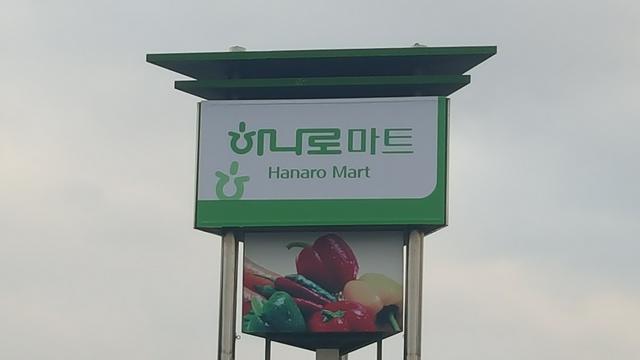
There is no big supermarket in Pyeongchang. You should shop in traditional markets or convenience stores or middle-sized markets such as Hanaro Mart.
- Pyeongchang Olympic Market, Pyeongchang, Pyeongchang-eup, Pyeongchang-gun, Gangwon Province, market 1-gil 8-1 (Pyeongchang-eup)., +82 33-332-2517. 07:00-20:00. Pyeongchang Olympic Market has been in business since 1955. It is in southern Pyeongchang. It is famous for buckwheat fry dish which over the past 40 years has been made the traditional way by directly grinding buckwheat.
- Bongpyung Traditional Market, +82 33-336-2301. Bongpyeongjang is the 5 days market is opened the 2th and 7th day. Buckwheat noodles, buckwheat pancakes, buckwheat muk, potato rice cakes, Tadpole noodles are sold in Bongpyung Traditional Market
- Jinbu Market, Jungang 61, Jinbu-myeon, Pyeongchang-gun, Gangwon-do, Korea, +82 33-335-3133. Jinbu Market will be held in the 3rd and 8th days of the old bus terminal. Junbu Market is the biggest figure in the Pyeongchang. they sell alpine vegetables, various kinds of Seasoned vegetables in mountain, medicinal herbs.
Pyeongchang Olympic Market, Pyeongchang, Pyeongchang-eup, Pyeongchang-gun, Gangwon Province, market 1-gil 8-1 (Pyeongchang-eup)., +82 33-332-2517. 07:00-20:00. Pyeongchang Olympic Market has been in business since 1955. It is in southern Pyeongchang. It is famous for buckwheat fry dish which over the past 40 years has been made the traditional way by directly grinding buckwheat.
Bongpyung Traditional Market, +82 33-336-2301. Bongpyeongjang is the 5 days market is opened the 2th and 7th day. Buckwheat noodles, buckwheat pancakes, buckwheat muk, potato rice cakes, Tadpole noodles are sold in Bongpyung Traditional Market
Jinbu Market, Jungang 61, Jinbu-myeon, Pyeongchang-gun, Gangwon-do, Korea, +82 33-335-3133. Jinbu Market will be held in the 3rd and 8th days of the old bus terminal. Junbu Market is the biggest figure in the Pyeongchang. they sell alpine vegetables, various kinds of Seasoned vegetables in mountain, medicinal herbs.
- Hanaro Mart Bongpyeong, Changdong-ri, Bongpyeong-myeon, Pyeongchang-gun, 276-2 (평창군 봉평면 창동리 276-2), +82 33-335-2122.
Hanaro Mart Bongpyeong, Changdong-ri, Bongpyeong-myeon, Pyeongchang-gun, 276-2 (평창군 봉평면 창동리 276-2), +82 33-335-2122.
- Bongpyeongwon, Yongpyeong-myeon, Pyeongchang-gun, Gangwon Province, Topgeorigil 8-8, bongpyeongwon., +82 33-336-7781. Buckwheat store in Pyeongchang, Bongpyeongwon sell buckwheat flour, buckwheat rice, buckwheat noodles, buckwheat tea, buckwheat cookies and buckwheat fried flour.
- Pyeongchang Farm, 898-43, Bangnim-myeon, Pyeongchang-gun, Gangwon-do, Korea, +82 033-332-9779. Pc Farm sells excellent agricultural products. You can buy seasoned vegetables, deodeok, kimchis, potatoes, etc.
Bongpyeongwon, Yongpyeong-myeon, Pyeongchang-gun, Gangwon Province, Topgeorigil 8-8, bongpyeongwon., +82 33-336-7781. Buckwheat store in Pyeongchang, Bongpyeongwon sell buckwheat flour, buckwheat rice, buckwheat noodles, buckwheat tea, buckwheat cookies and buckwheat fried flour.
Pyeongchang Farm, 898-43, Bangnim-myeon, Pyeongchang-gun, Gangwon-do, Korea, +82 033-332-9779. Pc Farm sells excellent agricultural products. You can buy seasoned vegetables, deodeok, kimchis, potatoes, etc.
- Dragon Valley hotel gift shop, 130, Yongsan-ri, Daegwalnyeong-myeon, Pyeongchang, +82 33 335-5757. Souvenir shop in Dragon Valley hotel.
Dragon Valley hotel gift shop, 130, Yongsan-ri, Daegwalnyeong-myeon, Pyeongchang, +82 33 335-5757. Souvenir shop in Dragon Valley hotel.
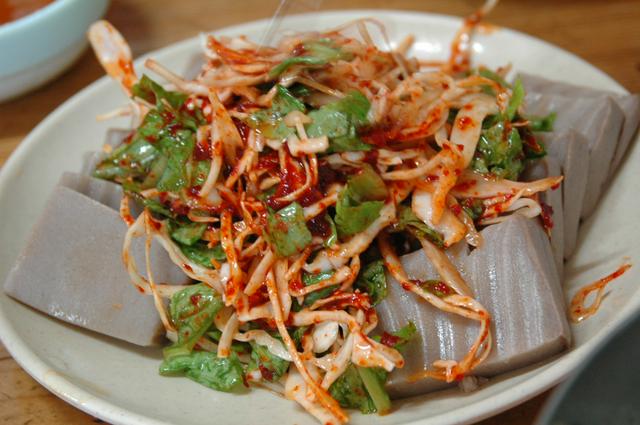
- Buckwheat is Pyeongchang's and Gangwon`s special regional product. There are many local foodstuffs made of buckwheat. One famous dish is makguksu (buckwheat noodles). There is two kind of makguksu. One is mulmakguksu (with cool soup) and another is bibimmakguksu (with spicy sauce). Buckwheat jelly is also a famous food in Pyeongchang.
- Korean beef is Pyeongchang's special regional product. There is some place near to Pyeongchang called Daegwanryeong. Daegwanryeong is highland so there is a good place to breed cow for beef. Actually, Gangwondo's Korean beef is famous in Korea because there are many good places to breed cow for beef. There is a famous Korean beef festival in Hoengseong (near to Pyeongchang).
- Rainbow trout is one of the most popular foods in Pyeongchang. The fish's country of origin is North America and Russia. In South Korea, it was imported and raised in Pyeongchang in 1965. Pyeongchang has held 'Pyeongchang Trout Festival' and rainbow trout is treated as a native fish even though it was imported. In Korea, there are almost no native trouts, Koreans treat rainbow trout as native trout. There is a reason why Pyeongchang's rainbow trout tastes good. The reason is in the water. Rainbow trout is raised in fish farms. Pyeongchang's fish farms use the water from a valley. It is cold and pure. Because the fish swim freely around the large area, their meat is tasty.
- Youngchun garden, 3591-10 chang ri, seo-dong ro, mee-tan myeon, Pyeongchang, gangwon (by taxi or car (because of the mountain territory), +82 33-334-9933. A famous restaurant for own growing Korean traditional chicken and Korean ogol chicken cuisine (Hangul:오골계, Korean traditional black chicken). also famous for a stewed chicken with oriental medicinal herbs. ₩20,000 per person and more.
- Paldo Myeon Ga, jungri 53, pyeongchangeup, pyeongchanggun, gangwon, +82 33-332-5975. A Korean traditional restaurant, that opened in 1980. Located nearby the Olympic market. A Buckwheat (Hangul: 막국수, Makgooksu), Spicy Stir-fried Chicken, a broiled eels are famous. Avoiding the artificial seasoning, only using a Korean traditional seasoning, natural herbs, local speciality. ₩10,000 per person and more.
Youngchun garden, 3591-10 chang ri, seo-dong ro, mee-tan myeon, Pyeongchang, gangwon (by taxi or car (because of the mountain territory), +82 33-334-9933. A famous restaurant for own growing Korean traditional chicken and Korean ogol chicken cuisine (Hangul:오골계, Korean traditional black chicken). also famous for a stewed chicken with oriental medicinal herbs. ₩20,000 per person and more.
Paldo Myeon Ga, jungri 53, pyeongchangeup, pyeongchanggun, gangwon, +82 33-332-5975. A Korean traditional restaurant, that opened in 1980. Located nearby the Olympic market. A Buckwheat (Hangul: 막국수, Makgooksu), Spicy Stir-fried Chicken, a broiled eels are famous. Avoiding the artificial seasoning, only using a Korean traditional seasoning, natural herbs, local speciality. ₩10,000 per person and more.
- Makgeolli(rice wine) is Korean traditional alcohol is makgeolli. Corn is one of Pyeongchang`s speciality so there is Pyeongchang corn makgeolli. Soju is also Korean traditional alcohol and there is also Pyeongchang soju which is made by Solraewon.
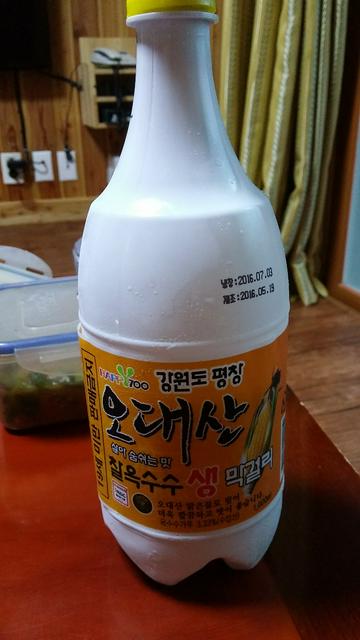
- Buckwheat tea is a tea that has been made from some processes. First, make a boiled rice by using the buckwheat and dry it. Then pour the water and boil it. Buckwheat tea is a native foods of Gangwon-do. Buckwheat tea has many positive potencies. The main effects are diuretic effect, adult diseases prevention, cure of hypertension, improvements of liver function, diet, and it makes one's mind clear. Also, the buckwheat is good because it contains many nutrients such as amino acids, vitamins, lysine rather than any other grains. But people who have indigestion, hypotension, stomach and intestines diseases might as well avoid the buckwheat. In Korea, there is a very famous novel, At Buckwheat Flower-blossom Time. The setting of this novel is Pyeongchang. Especially Pyeongchang-gun Bongpyeong-myeon is famous for the novel and buckwheat.
South Korea generally has a good deal of security. Drugs, gambling, and guns are prohibited in Korea. Pyeongchang has a population of 43,500 so this city is categorized as a small city in Korea. Also, owing to the small floating population, security is kept well. The crime rate in Pyeongchang is 91.0 per 10,000 people which is an average rate of Korea, so it is not a city to pay extra attention. Moreover, Gangwon-do Province Police has a high arresting rate of crime.
However, visitors need a basic sense of safety. Beware of pickpockets, beggars or violence. For visitors' safe travel, there are some emergency contacts. In Korea, civil servants can speak English basically, so visitors can solve many civil complaints without any problems if they report it in English.
- Fire, Medical Emergency, Rescue, 119.
- Emergency Sickness Consultations and Hospital Information, 1339.
- Reporting a crime, 112.
- Child Abuse, 1577-1391 (in country only).
- Missing Persons/Run-aways, 182.
- Women Hotline, 1366, 1577-1366 (in country only).
- Violation of Human Rights, Discrimination, 1331.
- Korea Legal Advice, 132.
- General Information Center for foreigners, 1345. Korean government has operated the General Information Center for foreigners. It provides venues for complaints or some information needed for foreigners who come to Korea. Visitors can use it by online (Hi-Korea website) and phone (1345). The online service is provided in 4 languages (Korean, English, Japanese, Chinese). The Call-center's consultation is provided in Korean and other 17 languages. It is available 09:00-18:00.
Fire, Medical Emergency, Rescue, 119.
Emergency Sickness Consultations and Hospital Information, 1339.
Reporting a crime, 112.
Child Abuse, 1577-1391 (in country only).
Missing Persons/Run-aways, 182.
Women Hotline, 1366, 1577-1366 (in country only).
Violation of Human Rights, Discrimination, 1331.
Korea Legal Advice, 132.
General Information Center for foreigners, 1345. Korean government has operated the General Information Center for foreigners. It provides venues for complaints or some information needed for foreigners who come to Korea. Visitors can use it by online (Hi-Korea website) and phone (1345). The online service is provided in 4 languages (Korean, English, Japanese, Chinese). The Call-center's consultation is provided in Korean and other 17 languages. It is available 09:00-18:00.
Nearby port cities include:
- Gangneung
- Sokcho
- Donghae, which has a ferry connection to Ulleungdo island.
- Hoengseong is close to Pyeongchang and hosts a famous Korean beef festival.
- Odaesan National Park is also nearby and includes Odaesan (오대산), which is considered one of the most beautiful mountains in South Korea.
